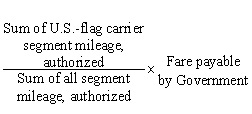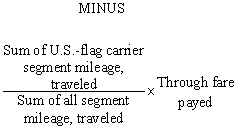Subpart 47.4 - Air Transportation by U.S.-Flag Carriers
47.401 Definitions.
As used in this subpart-
Air freight forwarder means an indirect air carrier that is responsible for the transportation of property from the point of receipt to the point of destination, and utilizes for the whole or any part of such transportation the services of a direct air carrier or its agent, or of another air freight forwarder.
Gateway airport abroad means the airport from which the traveler last embarks en route to the United States or at which the traveler first debarks incident to travel from the United States.
Gateway airport in the United States means the last U.S. airport from which the traveler’s flight departs or the first U.S. airport at which the traveler’s flight arrives.
International air transportation means transportation by air between a place in the United States and a place outside the United States or between two places both of which are outside the United States.
United States means the 50 States, the District of Columbia, and outlying areas of the United States.
U.S.-flag air carrier means an air carrier holding a certificate under section 401 of the Federal Aviation Act of1958 ( 49 U.S.C. 41102).
47.402 Policy.
Federal employees and their dependents, consultants, contractors, grantees, and others must use U.S.-flag air carriers for U.S. Government-financed international air travel and transportation of their personal effects or property, if available (Section5 of the International Air Transportation Fair Competitive Practices Act of1974 ( 49 U.S.C. 40118) (Fly America Act)).
47.403 Guidelines for implementation of the Fly America Act.
This section 47.403 is based on the Guidelines for Implementation of the Fly America Act (case number B-138942), issued by the Comptroller General of the United States on March 31,1981.
47.403-1 Availability and unavailability of U.S.-flag air carrier service.
(a) If a U.S.-flag air carrier cannot provide the international air transportation needed or if the use of U.S.-flag air carrier service would not accomplish an agency’s mission, foreign-flag air carrier service may be deemed necessary.
(b) U.S.-flag air carrier service is considered available even though-
(1) Comparable or a different kind of service can be provided at less cost by a foreign-flag air carrier;
(2) Foreign-flag air carrier service is preferred by, or is more convenient for, the agency or traveler; or
(3) Service by a foreign-flag air carrier can be paid for in excess foreign currency (unless U.S.-flag air carriers decline to accept excess or near excess foreign currencies for transportation payable only out of such monies).
(c) Except as provided in paragraph 47.403-1(a), U.S.-flag air carrier service shall be used for U.S. Government-financed commercial foreign air travel if service provided by U.S.-flag air carriers is available. In determining availability of a U.S.-flag air carrier, the following scheduling principles shall be followed unless their application would result in the last or first leg of travel to or from the United States being performed by a foreign-flag air carrier:
(1) U.S.-flag air carrier service available at point of origin shall be used to destination or, in the absence of direct or through service, to the farthest interchange point on a usually traveled route.
(2) When an origin or interchange point is not served by a U.S.-flag air carrier, foreign-flag air carrier service shall be used only to the nearest interchange point on a usually traveled route to connect with U.S.-flag air carrier service.
(3) When a U.S.-flag air carrier involuntarily reroutes the traveler via a foreign-flag air carrier, the foreign-flag air carrier may be used notwithstanding the availability of alternative U.S.-flag air carrier service.
(d) For travel between a gateway airport in the United States and a gateway airport abroad, passenger service by U.S.-flag air carrier shall not be considered available if-
(1) The gateway airport abroad is the traveler’s origin or destination airport and the use of U.S.-flag air carrier service would extend the time in a travel status, including delay at origin and accelerated arrival at destination, by at least 24 hours more than travel by a foreign-flag air carrier; or
(2) The gateway airport abroad is an interchange point and the use of U.S.-flag air carrier service would require the traveler to wait 6 hours or more to make connections at that point, or if delayed departure from, or accelerated arrival at, the gateway airport in the United States would extend time in a travel status by at least 6 hours more than travel by a foreign-flag air carrier.
(e) For travel between two points outside the United States, the rules in paragraphs 47.403-1(a), (b), and (c) shall be applicable, but passenger service by a U.S.-flag air carrier shall not be considered to be reasonably available if-
(1) Travel by a foreign-flag air carrier would eliminate two or more aircraft changes en route;
(2) One of the two points abroad is the gateway airport en route to or from the United States and the use of a U.S.-flag air carrier would extend the time in a travel status by at least 6 hours more than travel by a foreign-flag air carrier, including accelerated arrival at the over seas destination or delayed departure from the overseas origin, as well as delay at the gateway airport or other interchange point abroad; or
(3) The travel is not part of the trip to or from the United States and the use of a U.S.-flag air carrier would extend the time in a travel status by at least 6 hours more than travel by a foreign-flag air carrier including delay at origin, delay en route, and accelerated arrival at destination.
(f) For all short-distance travel under either paragraph (d) or paragraph (e) of 47.403-1, U.S. air carrier service shall not be considered available when the elapsed travel time on a scheduled flight from origin to destination airport by foreign-flag air carrier is 3 hours or less and service by a U.S.-flag air carrier would involve twice such travel time.
47.403-2 Air transport agreements between the United States and foreign governments.
Nothing in the guidelines of the Comptroller General (see 47.403) shall preclude, and no penalty shall attend, the use of a foreign-flag air carrier that provides transportation under an air transport agreement between the United States and a foreign government, the terms of which are consistent with the international aviation policy goals at 49 U.S.C. 1502(b) and provide reciprocal rights and benefits.
47.403-3 Disallowance of expenditures.
(a) Agencies shall disallow expenditures for U.S. Government-financed commercial international air transportation on foreign-flag air carriers unless there is attached to the appropriate voucher a memorandum adequately explaining why service by U.S.-flag air carriers was not available, or why it was necessary to use foreign-flag air carriers.
(b) When the travel is by indirect route or the traveler otherwise fails to use available U.S.-flag air carrier service, the amount to be disallowed against the traveler is based on the loss of revenues suffered by U.S.-flag air carriers as determined under the following formula, which is prescribed and more fully explained in 56 Comp. Gen. 209 (1977):


(c) The justification requirement is satisfied by the contractor’s use of a statement similar to the one contained in the clause at 52.247-63, Preference for U.S.-Flag Air Carriers. (See 47.405.)
47.404 Air freight forwarders.
(a) Agencies may use air freight forwarders that are engaged in international air transportation ( 49 U.S.C. 1301(c)) for U.S. Government-financed movements of property. The rule on disallowance of expenditures in 47.403-3(a) applies also to the air carriers used by these international air freight forwarders.
(b) Agency personnel shall inform international air freight forwarders that to facilitate prompt payments of their bills, they shall submit with their bills-
(1) A copy of the airway bill or manifest showing the air carriers used; and
(2) Justification for the use of foreign-flag air carriers similar to the one shown in the clause at 52.247-63, Preference for U.S.-Flag Air Carriers.
47.405 Contract clause.
The contracting officer shall insert the clause at 52.247-63, Preference for U.S.-Flag Air Carriers, in solicitations and contracts whenever it is possible that U.S. Government-financed international air transportation of personnel (and their personal effects) or property will occur in the performance of the contract. This clause does not apply to contracts awarded using the simplified acquisition procedures in part 13 or contracts for commercial products (see part 12).
 An official website of the United States Government
An official website of the United States Government


